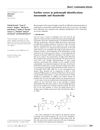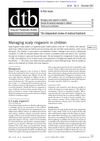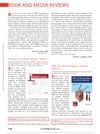 January 2024 in “European journal of endocrinology”
January 2024 in “European journal of endocrinology” The article was retracted due to data integrity issues.
 June 2023 in “Dermatology and therapy”
June 2023 in “Dermatology and therapy” The Middle East and Africa need better data, treatment consensus, and support for Alopecia Areata.
 August 2016 in “Organic Process Research & Development”
August 2016 in “Organic Process Research & Development” Authors retracted paper due to errors in data and mislabeling.
 68 citations,
January 2007 in “Journal of Cosmetic and Laser Therapy”
68 citations,
January 2007 in “Journal of Cosmetic and Laser Therapy” Laser/light treatments for hair loss are popular but lack scientific data proving effectiveness.
64 citations,
October 2018 in “Thérapie” Enriching the French health care database with external data greatly improved its usefulness.
 19 citations,
August 2006 in “Acta crystallographica”
19 citations,
August 2006 in “Acta crystallographica” Errors found in identifying furosemide and finasteride polymorphs due to incomplete data.
 5 citations,
October 2014 in “Methods”
5 citations,
October 2014 in “Methods” The document explains how to create detailed biological pathways using genomic data and tools, with examples of hair and breast development.

A rapid screening method using trichoscopy and clinical data can improve diagnosis and treatment of tinea capitis.
 March 2024 in “Birth defects research”
March 2024 in “Birth defects research” The commentary stresses the importance of using historical control data and proper interpretation in evaluating developmental toxicity.
 June 2023 in “Journal of Cosmetic Dermatology”
June 2023 in “Journal of Cosmetic Dermatology” AI and AR are improving cosmetic dermatology but face challenges like data quality and ethical concerns.
 January 2023 in “Journal of The American Society of Nephrology”
January 2023 in “Journal of The American Society of Nephrology” Metatrials could improve clinical research in nephrology by speeding up data collection and overcoming challenges like patient recruitment.

Pre-trained Transformers need extreme retraining to perform well on DarkNet data.
 September 2018 in “Value in Health”
September 2018 in “Value in Health” Orphan drug benefit scores in Germany are influenced by phase III data and lack of alternatives, but not linked to price or discounts.

The peer review highlighted the need for clearer data handling, questioned the study's validity, and recognized improvements from the original version.

The study improved and was accepted despite initial concerns about data clarity, methodology, and potential overfitting.
 82 citations,
September 2011 in “Quality of Life Research”
82 citations,
September 2011 in “Quality of Life Research” Choosing the right recall period for patient feedback is important for accurate data and depends on the disease, symptom changes, and patient impact.
 13 citations,
May 2020 in “Journal of Plastic Reconstructive and Aesthetic Surgery”
13 citations,
May 2020 in “Journal of Plastic Reconstructive and Aesthetic Surgery” Botulinum toxin's effectiveness for treating scalp alopecia is not well-supported due to insufficient data.
 7 citations,
April 2012 in “Clinical investigation”
7 citations,
April 2012 in “Clinical investigation” Transdermal testosterone can improve sexual desire in postmenopausal women but lacks long-term safety data and is not FDA-approved for this use.
 2 citations,
April 2020 in “bioRxiv (Cold Spring Harbor Laboratory)”
2 citations,
April 2020 in “bioRxiv (Cold Spring Harbor Laboratory)” MendelVar is a tool that helps identify important genes by combining GWAS data with Mendelian disease information.
 1 citations,
December 2013 in “Turkderm”
1 citations,
December 2013 in “Turkderm” Use of cosmeceuticals during pregnancy and breastfeeding is not recommended due to insufficient safety data.
 1 citations,
December 2007 in “Drug and therapeutics bulletin”
1 citations,
December 2007 in “Drug and therapeutics bulletin” New treatments for children's scalp ringworm are recommended based on recent data.
 April 2019 in “Journal of Investigative Dermatology”
April 2019 in “Journal of Investigative Dermatology” The search scheme SMRI is faster and more secure for retrieving encrypted data from the cloud.
 February 2021 in “Journal of The American Academy of Dermatology”
February 2021 in “Journal of The American Academy of Dermatology” Platelet-rich plasma therapy's effectiveness for female hair loss needs more accurate data and further examination.
April 2016 in “Dermatología Revista Mexicana” The effectiveness of APRP for hair loss is unclear due to limited data.
 85 citations,
June 2015 in “Scientific Reports”
85 citations,
June 2015 in “Scientific Reports” The study found that diseases can be grouped by symptoms and that the accuracy of predicting disease-related genes varies with the data source.
12 citations,
May 2018 in “British journal of dermatology/British journal of dermatology, Supplement” Methotrexate's effectiveness for maintaining hair regrowth in alopecia totalis is unclear due to limited and biased data.
 7 citations,
August 2019 in “Aesthetic Plastic Surgery”
7 citations,
August 2019 in “Aesthetic Plastic Surgery” Both surgical and non-surgical hair loss treatments lack a standard treatment plan and sufficient patient satisfaction data.
 2 citations,
September 2023 in “JMIR. Journal of medical internet research/Journal of medical internet research”
2 citations,
September 2023 in “JMIR. Journal of medical internet research/Journal of medical internet research” Machine learning can predict symptoms and quality of life in chronic skin disease patients using smartphone app data, and shows that app use varies with patient characteristics.
 2 citations,
March 2020 in “Plastic and Reconstructive Surgery”
2 citations,
March 2020 in “Plastic and Reconstructive Surgery” The book provides guidelines for using PRP and microneedling in skin treatments, despite limited scientific data.
 2 citations,
March 2020 in “Cns & Neurological Disorders-drug Targets”
2 citations,
March 2020 in “Cns & Neurological Disorders-drug Targets” Lurasidone is effective for bipolar depression and schizophrenia, but more safety data is needed.



























